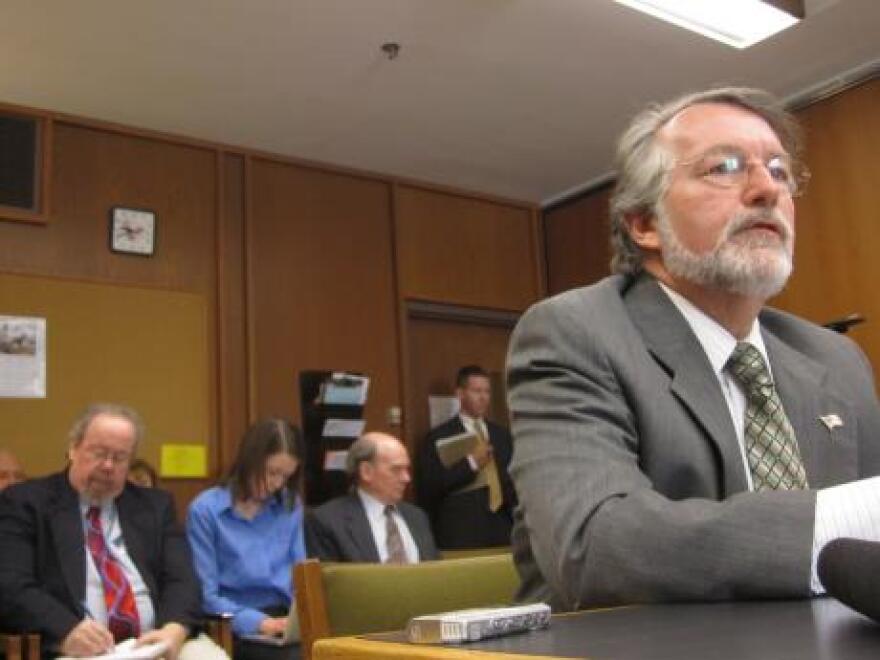A joke about being New Hampshire Speaker of the House is that you get a parking spot, $125 annual salary, and the chance to bang a gavel.
But when Bill O’Brien took the position in 2010, he took an important but largely under the radar position into the spotlight.
"It’s been all about O’Brien," says Dante Scala, a political scientist at UNH. "For better or worse, O’Brien became the center of gravity in the New Hampshire legislature, and the face of the New Hampshire legislature, in a way that past Speakers rarely are."
And O’Brien has been a lightning rod for conflict.
The 61-year old attorney from Mont Vernon is finishing up his third term in Concord.
Leading up to the elections two years ago, O’Brien recruited other conservative candidates to run for the House. When many were elected in a GOP landslide, they helped O’Brien win the speakership.
Scala: O’Brien has certainly seen himself as this warrior for conservative ideology. He was not a ‘go along to get along’ type of speaker. He was on a mission.
That mission started with a controversial budget that slashed spending across the board. The cuts were part of O’Brien’s vision for the role of government. He’s been critical of Democratic Governor John Lynch for not taking on the big challenges facing New Hampshire.
"There’s a benefit politically in always looking for the small issues," says O'Brien. "Governor Lynch has always been a person who turns to the small issues."
But after 8 years in office, Lynch remains overwhelmingly positive. The Legislature under O’Brien doesn’t rate nearly as well.
In fact, a UNH survey center poll rated the GOP legislature one of the state’s biggest problems.
Inside the statehouse, O’Brien also had his detractors.
Democrats label him a tyrant. And a fellow Republican even sought legislation to ban bullying in the statehouse after a heated encounter with the Speaker.
Arm-twisting, of course, is nothing new in politics.
But Republican Donna Styek, who served as New Hampshire Speaker in the late 90’s, says that tactic can only go so far.
"If you can’t win them with the power of your idea, or their sense of loyalty to the party…if you can’t persuade them, you’ve lost the battle."
O’Brien's reputation for tough tactics isn’t new. Colleagues on the Mont Vernon School Board, where he served before coming to Concord, say O’Brien always played to win.
"I actually looked at most of our school board meetings as a chess match," says Peter King, who served as Board Chair at the time.
He says O’Brien was tactical, often bringing up last-minute motions well after the public had left marathon sessions.
"At one point, he proposed a motion to unfund our special education program. Because he was adamant that it was an unfunded mandate, we shouldn’t have to pay for it. And my response was, ‘But Bill, we are going to end up in front of the Supreme Court if we do that,’ and he looked at me and said, ‘That would please me, Peter.’"
It would please Democrats to remove the Speaker from office. David Woodbury is trying to do just that, running against O’Brien in his House race.
"Let’s face it. Speaker O’Brien has loads of negatives out there. I’m sure he has some strong followers and strong supporters. But there are plenty of people out there that are disenchanted with him, and that is going to be a struggle for him."
It may not be much of a struggle, though. The district is Republican-leaning, and O’Brien certainly has name recognition.
That name is showing up in races all across the ticket.
Hassan: "We can continue bringing people together to move New Hampshire forward, or we can go in the direction of Speaker Bill O'Brien and the current legislature."
That’s Democratic gubernatorial candidate Maggie Hassan. She’s made O’Brien as much of a political target as her actual opponent, Ovide Lamontagne.
It’s a sign of just how much the New Hampshire political world swirls around the Speaker right now.
That may change after Tuesday, if Republicans don’t win solid majorities, Bill O’Brien’s days as speaker may be numbered.
But as his allies and his opponents will both tell you, he’s not the sort to go down without a fight.








